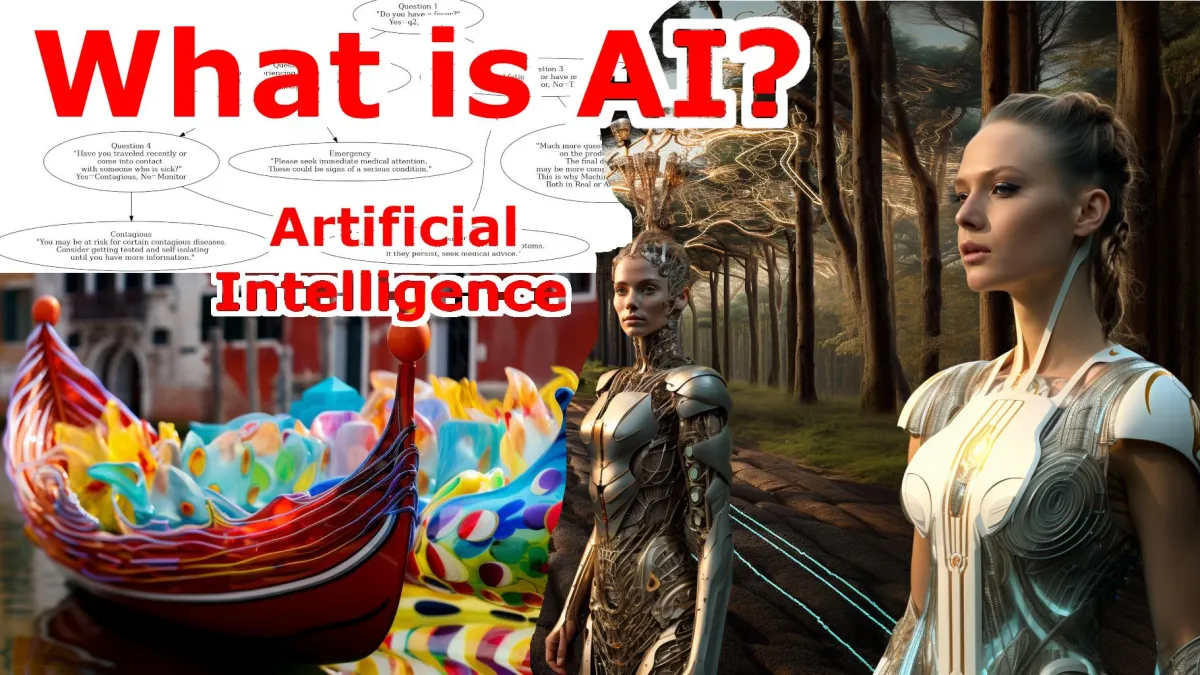Brand New From Videnda AI
New Generative AI Reveals How To Create Content at Almost Human Level
...Even if it is not easy to make it work

Videnda AI






From the desk of Videnda AI,
Dear Friend,
If you want to learn Artificial Intelligence, this will be the most important book and course you'll ever read.
Did we expect this exponential growth of AI?
The Realm of Artificial Intelligence
The advancements in Artificial Intelligence (AI) have surpassed expectations in multiple ways, leading to a blend of surprise and skepticism among many. Initially, the prowess of AI was underestimated, especially in terms of its capability to deliver remarkable results. The level of sophistication and effectiveness AI has achieved, particularly in areas such as natural language processing and machine learning, was once thought to be decades away. This rapid evolution has debunked many preconceived notions about the limits of AI technology.
Equally surprising has been the accessibility of AI. It was a common belief that such advanced technology would be reserved for tech giants and specialized institutions. However, the reality has unfolded differently. Today, AI tools are readily available and accessible to almost anyone, from small businesses to individual hobbyists. This democratization of AI technology has enabled a broader spectrum of people to explore and leverage its potential, breaking down barriers that once seemed insurmountable.
Another aspect where AI has defied expectations is in its ease of learning and application. The initial outlook on AI suggested a steep learning curve, requiring deep technical expertise to even begin. Yet, the reality has been more welcoming. With user-friendly interfaces, comprehensive APIs, and intuitive prompt-based systems, AI is now more approachable than ever. Individuals without a background in programming or data science can learn to prompt, program, and utilize AI effectively, opening doors to a wide range of creative and practical applications.
In summary, the journey of AI from a complex, inaccessible technology to a user-friendly tool accessible to the masses signifies a remarkable leap. This transition not only addresses skepticism but also highlights the ever-evolving nature of AI, promising even more groundbreaking developments in the future.



The Benefits of AI!
Self-Driving Cars: AI enables vehicles to navigate safely and efficiently, reducing accidents caused by human error, easing traffic congestion, and providing mobility solutions for those unable to drive.
Advanced Diagnostics: AI can swiftly analyze data from various medical imaging devices like radiography, MRIs, thermal imaging, and blood analysis, leading to faster, more accurate diagnoses and personalized treatment plans.
Precision Marketing: AI's ability to analyze vast amounts of consumer data allows for highly targeted marketing strategies. It can predict consumer behavior, tailor messages to individual preferences, and optimize marketing spend for maximum ROI.
Development of New Materials: AI aids in the discovery and design of new materials, accelerating the process of identifying compounds with desired properties for applications in technology, construction, and renewable energy.
Innovative Drug Discovery: AI can analyze complex biological data and simulate drug interactions, speeding up the discovery of new medicines and therapies, and potentially unlocking cures for chronic diseases.
Robots in Hazardous Environments: AI-powered robots can operate in extreme conditions like fire, radioactive environments, or other planets. They are invaluable for tasks like firefighting, nuclear disaster management, and space exploration.
Smart Agriculture: AI optimizes farming practices, from predicting weather patterns and analyzing soil conditions to automating irrigation and harvesting, leading to increased crop yields and sustainable farming
methods.
Enhanced Supply Chain Management: AI improves supply chain efficiency by forecasting demand, optimizing logistics, and managing inventory, resulting in reduced costs and improved customer satisfaction
Energy Efficiency: AI algorithms can predict and manage energy consumption in various sectors, contributing to energy conservation and the efficient use of renewable resources.Educational Personalization: AI enables personalized learning experiences by adapting to individual student's learning styles and progress, enhancing engagement and educational outcomes
Benefits of Learning AI!
Learning about Artificial Intelligence through courses and books offers a wide array of benefits:
Career Advancement: With AI being a rapidly growing field, gaining knowledge in this area can open up numerous career opportunities in tech, finance, healthcare, and other industries.
Enhanced Problem-Solving Skills: Understanding AI helps develop complex problem-solving skills, as it involves learning about algorithms, data analysis, and innovative thinking.
Stay Ahead in Tech Evolution: Keeping abreast with AI developments ensures you stay informed and ahead in the constantly evolving tech landscape, enabling you to adapt to new technologies and methodologies
Improved Decision-Making Ability: Knowledge of AI can enhance decision-making, as it involves understanding data patterns and predictive analytics, useful in both personal and professional contexts.
Increased Creativity and Innovation: Learning AI encourages thinking outside the box, leading to innovative solutions in various fields, from software development to creative arts
Enhanced Technical Skills: Even basic knowledge in AI can improve your technical literacy, making you more adept at using and understanding modern technologies and tools.
Networking Opportunities: Engaging in AI learning communities can connect you with professionals and enthusiasts, opening doors to collaborations and networking.
Personal Development: The challenge of learning something as complex as AI can be personally fulfilling, improving your confidence and cognitive abilities.